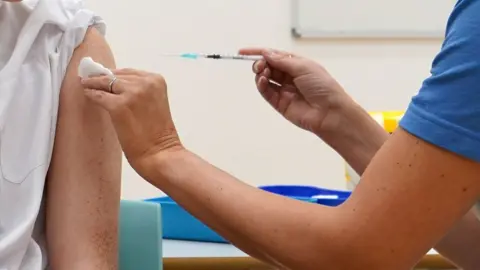Covid: Northamptonshire children, 12-15, urged to get jabs
 PA Media
PA MediaParents have been urged to allow their 12 to 15-year-olds to get a Covid jab in a county with some of the highest case rates in England.
In the week to 29 September, Kettering in Northamptonshire had the highest rate and Daventry the fifth highest.
Corby, Northampton and Wellingborough were also in the top 20 by district.
Public health officials said positive cases in the 10 to 19-year-old age group was behind the increase, but said this was "not completely unexpected".
Last week, the rollout of the vaccine for 12 to 15-year-olds began in Northamptonshire.
Public Health Northamptonshire said it was "urging young people to get the vaccination when offered to help reduce the growing number of infections locally".
It said parents and guardians should "respond promptly to consent requests when contacted".
Many secondary schools in Northamptonshire have also reintroduced masks in communal areas.

Case rates in Northamptonshire
 Getty Images
Getty Images- Kettering: 929 cases per 100,000 people, a 3% week-on-week increase, the highest case rate by district in England
- Daventry: 669 cases per 100,000 people, a 36% week-on-week increase, the fifth highest case rate
- Corby: 619 cases per 100,000 people, an 8% week-on-week decrease, the 11th highest case rate
- Northampton: 580 cases per 100,000 people, a 26% week-on-week increase, the 16th highest case rate
- Wellingborough: 572 cases per 100,000 people, a 28% week-on-week increase, the 19th highest case rate
- East Northamptonshire: 424 cases per 100,000 people, a 18% week-on-week increase, the 79th highest case rate
- South Northamptonshire: 364 cases per 100,000 people, a 4% week-on-week decrease, the 136th highest case rate
Figures for the week to 29 September

Lucy Wightman, director of public health in Northamptonshire, also said parents of pupils who test positive should "fully engage" with NHS Test and Trace.
"For our local contact tracers, the biggest problems are around activity data and locations," she said.
Parents and guardians would be asked about what children have done in the last two weeks, Ms Wightman said.
"They will need to provide as much contact data as possible, especially when it comes to overnight stays, sleepovers and out-of-school clubs so we can map the spread of the disease," she added.

Find BBC News: East of England on Facebook, Instagram and Twitter. If you have a story suggestion email [email protected]
